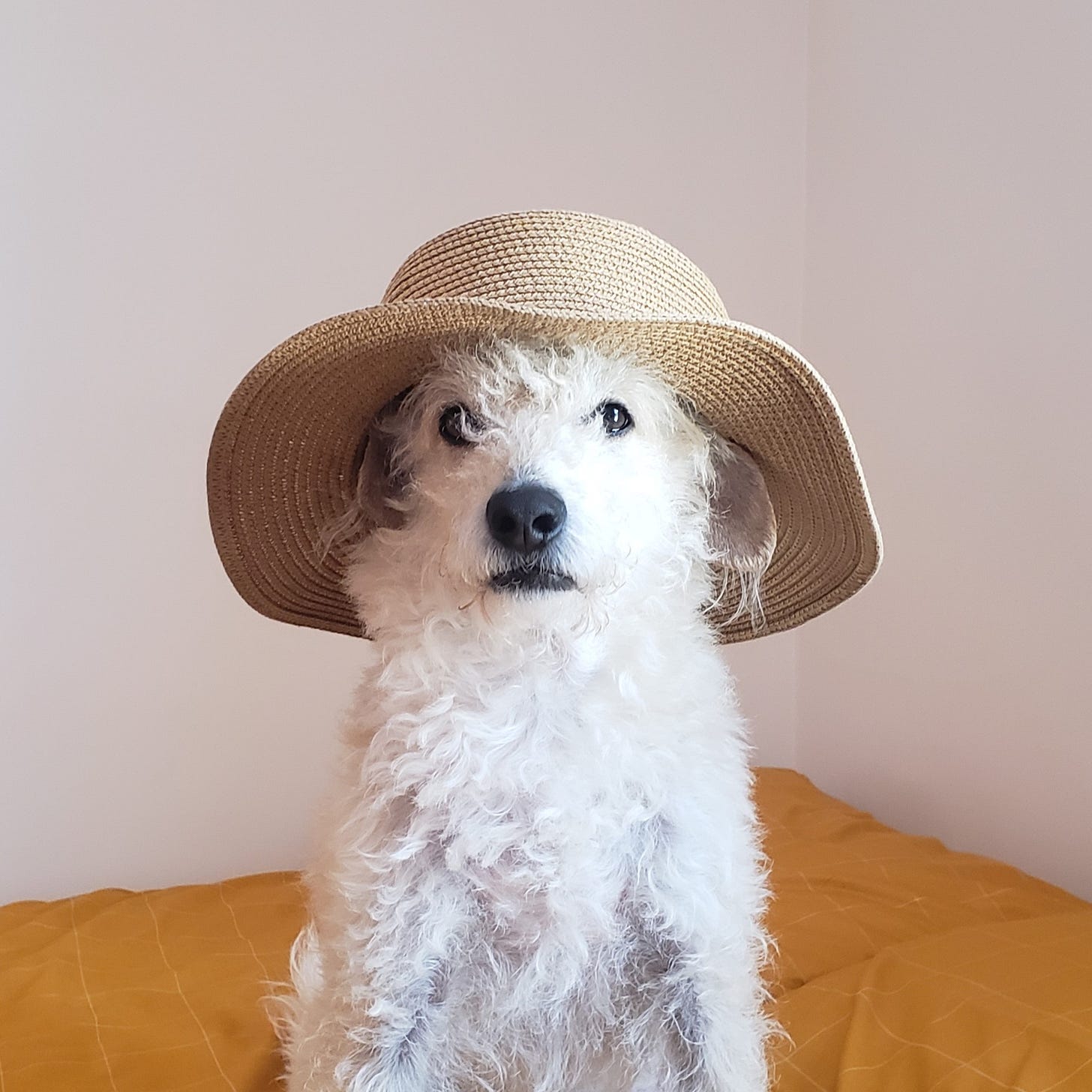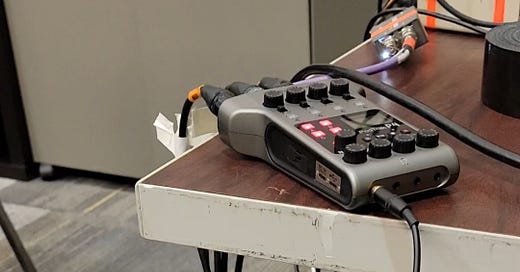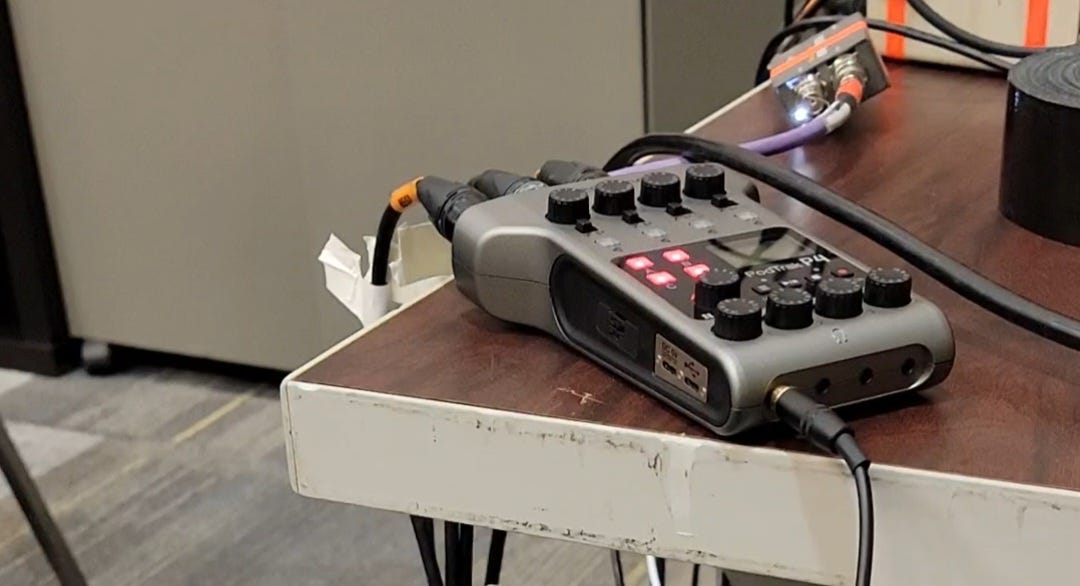They all rookie down here. You'll rookie too.
Vol. 7 - Rookie mistakes, PLUS Falen Johnson on Indigenous podcasting and making Buffy.
Hihi!! Happy Pod the North Tuesday. So it’s winter now, eh?
In this issue:
A reminder to slow down.
Falen Johnson says Indigenous podcasts are not at capacity.
Canadian Indie: This Isn’t Therapy
True North Podcast Feature: 2 Crees in a Pod
Canadian podcasting is BUSY!!
FYI: There are currently 31 long-term drinking water advisories in effect in 27 First Nations communities across Canada!
Recently the universe confirmed that spooky season lasts at least until mid-November.
Not just because I have yet to take down the festive pumpkin lights on my front porch, but because I just got possibly the biggest spook of my career: I made a rookie mistake.
Two weeks ago I made the journey to sunny Ottawa with the BetaKit Podcast for our second year running the podcast booth at SAAS NORTH, where we recorded various interviews throughout the 2-day conference.
The big exciting change this year though was doing our first live show!
Despite the live show being slotted for a brutal 7:30am, I was pretty confident about it. The week prior I had multiple calls with the conference’s A.V. team to confirm what we needed and I did multiple tech checks in person to make sure we could capture each of our hosts on seperate tracks for the final episode that’d be released the next day.
And let me tell you, it takes a certain level of gumption to be the short lady walking into a room full of tall A.V. guys, with her tiny little PodTrak in-hand, and ignore the patronizing look on their faces when she tells them she needs to mess around with their set-up.
Anyway, our live show day came, I tested everyones mics, I told each host where their best mic placement was. The live show started and I sat back of house and bossed the (ultimately very kind) A.V. guy around a bit when the mics were too hot.
The show was great, the audience was super engaged. The show wrapped up and that’s when I noticed,
I forgot to hit the record button.
I felt so defeated and like such a rookie.
Luckily, my pre-show brain did have the smarts to make sure that we had a back-up recording going, which ultimately saved the day.
In the big book of podcasting mistakes, “forgetting to hit record” is on page one. But in the midst of a whirlwind couple of days and the pressure of our first live show, maybe it was inevitable that I’d focus on everything but the obvious.
Hey, in this day and age shouldn’t podcasting equipment be able to read our minds and just KNOW when it’s showtime anyway??
Regardless of podcast tech advancements that don’t exist, this is your sign to slow down.
Hustling through a production is the type of blatantly-human mistake that ANYONE could make, whether you’ve been the industry for 10 months or 10 years.
Producers, especially freelancers, love to put their own needs on the back burner if it means things will be “smooth” for everyone else. As a podcaster you might feel the pressure to make things happen fast — to be efficient with people’s time. But everyone’s time is wasted with rushed, sloppy work. Everyone’s time is definitely wasted on a podcast that wasn’t recorded.
It is well within your scope of production put everything on pause and take a couple minutes to do some housekeeping. To make sure your “I"s are dotted and “T”s are crossed.
That time is so crucial, no matter how many times someone tells you they’ve “got a hard stop in 30 minutes”.
So, have you got a big podcast coming up? Take it from me, set a calendar alert now to make sure that once everyone’s settled you take a beat before you start the show.
To be extra safe, here’s a handy pre-production checklist from Blubrry that you can bookmark on your web browser.
Thoughts from the ecosystem:
Falen Johnson says Indigenous podcasts are not at capacity.
This week I’m talking to Falen Johnson, Producer and Podcast Host at CBC and member of the Six Nations of the Grand River.
I caught up with Falen to pick her brain on some of the themes I talked about with Cassidy Villebrun-Buracas a couple issues ago, in particular this reflection of his:
There are Indigenous people who get to that level where they've “made it''.
Then they get tapped for everything and become overworked and overburdened to be the representative. Like the Connie Walkers, the Falen Johnsons. Everyone wants a piece of them because they're like gold in the industry.
- Cassidy Villebrun-Buracas
After bonding over bangs and live radio, Falen and I talked about burnout, Buffy, dead feeds, and CBC's role in the Indigenous storytelling.
In honour of this oddly, spookily themed newsletter, Falen is the perfect person for this issue as she is also a spooky podcast fan. Find her podcast favs at the end of our convo!
This interview has been edited and condensed for brevity.
Kattie: In a previous issue, Cassidy [Villebrun-Buracas] mentioned this idea of the golden child of Indigenous podcasters.
Not only do you host Secret Life of Canada but you are also on Unreserved and you just produced Buffy. So first of all, how are you doing? How are you still alive?
Falen: Leah[-Simone Bowen], cohost of Secret Life Canada, recommended this book on burnout that I picked up. I feel like I have a hard time saying no to things.
The meme that best demonstrates freelance work to me is that Ralph Wiggum meme where he lifts up the mailbox flag and he laughs. My freelance life was so much of just waiting for the mail carrier to come and cursing the check that didn't show up.
So that is why I am full time at the CBC because I think a lot of Indigenous people and Indigenous creators want security.
That comes with taking on a lot of responsibility because I do want to say yes to everything, and I wanna get as much experience as I can, and I wanna be valuable. I want my value to be undeniable.
There aren't enough Indigenous people telling our stories and there haven't been for a very long time.
The burnout comes from telling the story. The burnout comes from the workload for sure. Then the burnout also comes from the education that you're doing contextualizing the stories, but also the load that you feel like you're carrying.
I'm sure you’re unpacking a lot of this in therapy too.
Oh, that's the best thing.
What are your thoughts on CBC's role in the Indigenous podcasting landscape? They seem to be doing a lot of work around producing podcasts with Indigenous stories.
The conversations that I'm privy to are probably not the ones where they're really talking about this stuff. But I do feel like there's an understanding that these stories need to be told and I think they're becoming more aware of appropriateness. There has to be the right person, with the right background, from the right nation who can tell that story.
It's interesting the way that the podcast department works. There's inhouse creations and they're bringing other Indigenous people in. Like Duncan [McCue] doesn't work for the podcast department, but they brought him in to work on [Kuper Island]. On Telling Our Twisted Histories they brought in Kaniehtiio Horn to narrate that series.
It was nice talking to Duncan [who] has been so supportive. I had questions for him when I was interviewing Buffy. Then he would ask me about, ‘how do you explain these giant concepts in a way that people don't just fall asleep?' I had a second person to bounce off of.
Are there any other initiatives that you've noticed happening within CBC podcasts in terms of working with Indigenous podcast creators?
The way that I'm often utilized as an Indigenous creator and podcast maker is like, someone would be like, ‘Hey, can you come and do this?’
There was a satellite office coming out of Six Nations where I'm from, trying to do Six Nations focused stories and publish it on the web. There was an in-person gathering that happened on the reserve, so they brought me in to talk with folks about what it is to make a podcast.
That is the thing that I think is really valuable about podcasting: we can center our voices. It's a way of making media that is really accessible to us. There's so much free stuff now.
So tell me about Buffy Sainte-Marie. What was it like interviewing her?
The first interview we had was in person. I knew I had two hours with her.
We had to find a way to keep her with us and to tell the story that the listener wants, which was really letting her know off the top, “so Buffy, we wanna talk to you about this, this, this. And I'm gonna ask you a lot of questions that are gonna make me sound like I don’t know what I’m talking about.”
She's used to being interviewed for radio or TV. So it was really interesting to be able to get her to slow down and reflect, and be in the moment with her. I learned a lot. I do feel proud of it.
In the hunt for Indigenous podcasts, I've noticed that a lot of them are on hiatus or have just gone missing.
With Coffee With My Ma, I listened to the whole series and in the last episode Kaniehtiio Horn says ‘I’m coming back with great things for season two’ and there is no season two.
It's just so sad. She's working on it I'm pretty sure. I talked to her a little bit about it, but I think it's also funding dependent. As much as we love making things, making things for free is not fun. It's not sustainable.
There aren't enough podcasts being made by Indigenous people that are supported by media outlets. I don't know why that is. We are not at capacity at all. Sometimes I wonder if it's because our stories come with that added layer of difficulty.
For the Buffy podcast, we wanted an Indigenous mixer but there's just not that many. So we found Nigel Irwin, who works for Bedtracks. It's a company that has Indigenous music that you can license. But he didn't have all the skills. So we paired him with Mira Burt-Wintonick.
The two of them worked on it together. And and you hear it, right? I just remember listening to the first cut of it and it took me like five hours to get through cause I just kept having to pause it and just lose my mind a bit.
I've never had that reaction to listening to a piece, which sounds so selfish.
Why are there so many dead feeds and what do you think needs to happen to see a healthier Indigenous podcasting community?
I don't think there's enough mainstream media. I don't think there's enough outlets who are acquiring or who are developing things in house. What I would love to see is more mainstream media organizations go through the dead feeds and see the talent.
I think generational wealth, it's a thing that a lot of indigenous folks don't have. So we don't have the luxury of not getting paid in the same way that a lot of people do. We need that support.
There’s so much more to do. I think mainstream media, in so many places has a bad reputation of jumping into whatever the story is, taking what they need - very extraction based - and then leaving. I think the way to counter that within podcasting is to invest.
You can't expect people to come outta nowhere. We don't come outta nowhere. In any of these media companies, I wanna see them start to bring more [Indigenous] people in so that we're not not asked to be everything all the time.
Yeah. And so you don't have to go to therapy
No, everybody should be in therapy.
Thank you for chatting with me Falen!
What Falen is listening to these days:
Savage Lovecast: America's only advice columnist answers your sex questions and yaps about politics.
Spooked: True-life supernatural stories, told firsthand by people who can barely believe it happened themselves
Fly on the Wall with Dana Carvey and David Spade: Be a “Fly on the Wall” as Saturday Night Live alumni take you behind the scenes.
Spirit Plate: Working to preserve and revitalize ancestral foodways.
The Art of Sovereignty: Explore the lives of eight First Nations artists whose art reclaims their voices and identities.
Check out this Canadian Indie: This Isn’t Therapy
Big feelings? Check! Impostor syndrome? Who’s she!? Anxiety? We have it.
This Isn’t Therapy... it's a podcast about it! In each episode, Jake Ernst and Simon Paluck peel back the curtain and talk about the topics that come up in therapy. It’s not therapy… it’s a silly and serious conversation about your favourite therapy themes.
True North Podcast Feature: 2 Crees in a Pod
Unapologetically creating space for Indigenous resurgence.
Amber and Terri’s podcasting mission is to disrupt western colonial systems and honor Indigenous helping practices. They chat with incredible Indigenous change-makers and get real about “reconcilliation”.
For your pod:
Submit your podcast for promotion on Apple Podcasts (free):
Featured content is chosen by Apple’s editors and is solely at the discretion of Apple. Submit the form with at least two weeks of lead time!
Nominations for the 27th Annual Webby Awards are now open! Enter by December 16th, 2022
RESOURCE: Join the Broads in Progress community:
POD.RALAND’s Alexandra Cohl has launched an exclusive accountability membership for women who want to grow their podcast and need help finding the time and support to make it happen. Plus, use the code NORTHBROAD and you'll get 50% off membership through to December 4th.
RESOURCE: How to pick the right theme music.
Pacific Content’s Head of Audio Production, Shawn Cole, goes through all the factors you should consider when choosing your theme music.
Audio stuff Black Friday deals! The wonderful Michal Stein wrote a very wholesome newsletter on Vocal Fridays last week that highlights some great deals on podcasting gear that are still on! Check it out.
I still talk to people that haven’t heard about TINK Media’s Podcast Swap Database, and it’s seriously one of the best community tools to enter the podcasting world. If your podcast isn’t on it, GET TO IT ALREADY.
What’s going on in Canada’s podcast ecosystem:
October Jones & Fish with Legs is back! This Montreal-based, indie, kids audio-drama podcast has launched it’s second season! The show explores themes of friendship and growing up and touches on bigger ideas of race, colonialism and critical thought. Listen here.
editaudio’s Original true crime podcast, Ozarks True Crime, launched it’s second season last week! Host Anne Roderique-Jones returns to her hometown in Springfield, Missouri to investigate the story of the 1995 Feeney Family Murders. Listen here.
THE SONAR NETWORK is celebrating its 5th anniversary with a 12-Hour Comedy Marathon on Sunday December 11th from 12pm to midnight ET. Mark it in your calendar and subscribe to their Youtube channel so your don’t miss it.
VANCOUVER PODCAST FESTIVAL wants to hear from you as they look ahead to the future of the festival! Fill out their survey here.
STORYTELLERS from BEDTRACKS: Learning about this Indigenous music library from Falen was pretty cool. Read more about it here.
Want to see what topics are trending in Apple Podcasts? Canada’s Audio Developement Wizard, Dan Misener, built more than 100 "topic maps" that visualize the podcast zeitgeist across Apple's podcast categories. It confirmed my gripe that the travel category may as well just be called the “Disney” category. Check it out.
Listen to Canadians, eh? on Earbuds Podcast Collective newsletter! Podcast Guru, Arielle Nissenblatt, gave me the space to spread the maple-flavoured gospel last week. Check out the podcasts I recommended.
Finally, a word from Joe…

If this newsletter brought up thoughts or questions for you, please share them with me! Leave a comment or reply to the newsletter email.
Thanks for supporting Pod the North, I’ll be back in your inbox in two weeks!
Kattie @podkatt
(Find me on Twitter or Post!)









